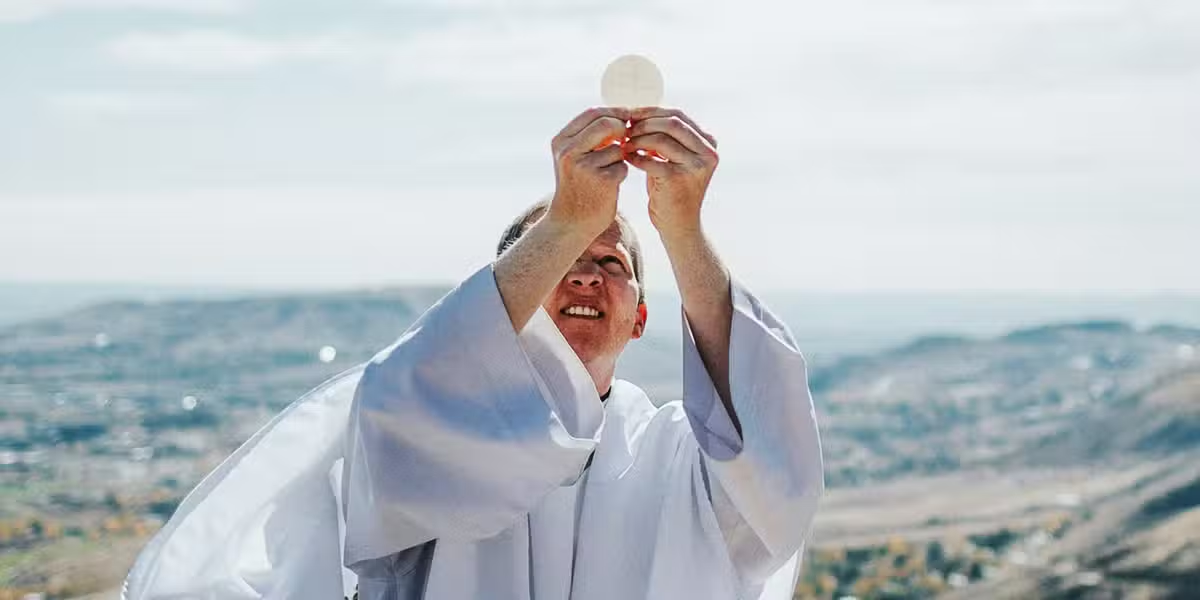(OSV News) — Before the “Homeland War” of the 1990s, the residents of Vukovar, Croatia, thought it a peaceful city. But a devastating tragedy interceded — and three decades later, the city lives in an uneasy peace, shrouded in memories of horrific tragedy and loss.
One of those who knows of such loss is Sister Franciska Molnar, 68, a member of the Sisters of Mercy of the Holy Cross, who ministers at the congregation’s home convent in Dakovo, a city about 35 miles west of Vukovar.
Sister Franciska grew up in Vukovar, a port city on the Danube River, which overlooks the border with neighboring Serbia. She recalls it as a place where people got along. Residents did not think much of the mixing of Orthodox Serbs and Catholic Croatians — though the Croatian majority was conscious that, during the communist era, Catholics were often not favored for jobs.
Peaceful dynamics changed swiftly, however, when Croatia declared independence from Yugoslavia in 1991 and the Yugoslav National Army, which included Serbian extremists, opposed the move, invading the country. Eventually Croatia won its war of independence but not before some 20,000 perished.
A fulcrum of the struggle was the fall of Vukovar in November 1991 after a nearly-three month siege. The city became the first European municipality to be destroyed since World War II, and was the site of numerous human rights violations against civilians. Witnesses at the time said that dozens of bodies lined Vukovar’s ash- and debris-covered streets.
But perhaps notoriously, Yugoslav national forces forcibly took some 400 people from Vukovar’s hospital — an institution founded by Sister Franciska’s congregation in 1940, though later confiscated after World War II by communist authorities.
Eventually about half of those were released — including a group of Catholic sisters — but others were transported to a farm outside the city and were executed. Some remain missing to this day; the bodies of others were found nearly a decade later in mass graves.
Among those who perished was Sister Franciska’s brother, Saša. He was 26 at the time and serving with Croatian forces. He was the father of two young children.
“He was defending his country,” Sister Franciska said quietly in an interview with Global Sisters Report at the congregation’s convent in Dakovo.
Sister Franciska, who was not in Vukovar during the siege, said her parents stubbornly held onto hope that their son would return — sometimes even laying out clothes for him. When Saša’s body was discovered in a mass grave nine years later, the family was devastated.
Sister Franciska’s own journey has not been easy, but she has been able to forgive her brother’s killers.
“I am open to all people, and even to those who killed my brother,” she said.
But Sister Franciska underlines that belief with what she says is a truth about forgiveness: She says the act of forgiveness does not emanate from her, but from God.
“I feel it is God’s grace that I can forgive,” she said. “I feel that it is important to live by the Gospel, God’s word. That’s God’s gift, God’s work.”
“The experience of forgiving helps me in my life, in the work I do,” she said, which includes helping supervise a sister-run food bank in Dakovo. But she adds, “It’s not always easy.”
Sister Franciska’s comments echo those of more than a dozen sisters interviewed earlier in December in Croatia and neighboring Bosnia and Herzegovina about both the fallout from the wars of 30 years ago and about their current ministries that are helping, in often small ways, both directly and indirectly, to heal the wounds of lands once riven by conflict.
The women religious stressed that meaningful lessons can be drawn from the wars, particularly the need to forgive a nation’s enemies and to remain close to people in need during conflict. But at the same time, the sisters’ focus now is on ministries that may have little direct connection to the past.
“The war is behind us; a new generation is coming,” said Sister Rastislava Ralbovsky, who is also a member of Sister Franciska’s congregation. “Our apostolate is focused on the needs of people now.”
Yet, she said, “There are still effects felt by those who suffered.”
Vukovar was rebuilt, but by several accounts has never fully regained its pre-war prosperity or footing: Its population dropped from about 46,000 in 1991 to 23,000 in 2021.
On a recent visit to Vukovar, Sisters Doroteja Krešic and Teuta Augustini, fellow members of
Sister Franciska’s congregation found a plaque with Saša Molnar’s name at the hospital memorial and said a brief prayer; “What happened here was pure evil,” Sister Teuta said.
Earlier, Sister Doroteja recalled family traumas from the war — whether it was an uncle who was assaulted by Yugoslav soldiers or the family home being damaged by a military assault. “People always said the war won’t last long,” she recalled, acknowledging that that is something that is always said when wars begin, whether the World Wars, the wars in Croatia and Bosnia or the current war in Ukraine.
On the issue of forgiveness, Sister Doroteja said she finds solace and strength in the Gospel of Luke’s reference to Jesus saying, “Father, forgive them, for they do not know what they are doing.”
But, like Sister Franciska, she said that belief is not simply or glibly said and embraced easily. Sister Doroteja knows of a woman who was raped during the war, prompting to ask herself, “Could I forgive if I were from Vukovar?”
“For many people, the war isn’t finished,” Sister Doroteja said. “There are wounds that are still fresh.”
Sister Rastislava and Sister Marija Klara Klaric, who also is a Sister of Mercy of the Holy Cross, minister in a program begun in 1996 to help people coping with trauma and spiritual scars after the war — be they veterans, war widows or those who lost children.
The program was an outgrowth of the congregation’s work in housing refugees from neighboring Bosnia and Herzegovina and Kosovo. It has since expanded to assist people with physical and mental disabilities, and it attracts Catholics of all ages needing spiritual sustenance.
Though Dakovo was not occupied, the sisters’ convent was filled with refugees, and personal contact was important, with the sisters providing accommodation, food and spiritual care, whether that meant prayer or daily praying the rosary. All were welcomed, regardless of faith or nationality.
And today the sisters remain welcoming — attentive to needs that include struggles with post-traumatic stress syndrome, a common concern with wives of veterans.
The wives are open to discussing their problems with the sisters — the men usually are not. “It’s hard to reach those men (with PTSD),” Sister Rastislava said. “It’s like they are closed. They are still suffering, and their wives are still suffering.”
The effects are still present and can manifest themselves in chemical addictions, depression and spousal abuse.
Many families are still struggling and sometimes it can feel like the needs are too overwhelming, Sister Rastislava said, but she also knows there are men and families who have recovered, feeling renewed and hopeful.
War anniversaries — even ones that are celebratory — can prompt moments of pain, said Sister Marija Klara, who lived in occupied Bosnia for six months and who left the country in the midst of war with her mother, sisters and brothers, arriving in Croatia in 1992. “Time makes it a little bit easier, but it can never heal fully. The scar always remains visible.”
She and Sister Rastislava take solace in knowing that whatever work they do helps people in any stage of recovery, “People are free in front of us — they trust us, believe in our vocations,” Klaric said. “They feel God’s closeness through us.”
Sister Damira Biškup, another member of the Sisters of Mercy of the Holy Cross, served 25 years at the maternal wing of Vukovar hospital, and stayed there through Vukovar’s fall.
“We were surrounded by enemies,” she recalled, and struggled with a lack of electricity, food and water — what little food came in was due to the assistance of humanitarian groups.
Sister Damira, 88, who is a trained nurse, was not directly threatened with violence, but she remembers having to run quickly from the hospital to the nearby convent where she lived and seeing numerous bodies on the streets. “It was very difficult to witness that,” she said.
She and four other sisters were able to leave Vukovar two days after the city’s fall Nov. 18, 1991, headed eventually to Zagreb, taking with them a premature infant girl Sister Damira carried in her arms — the girl’s mother couldn’t stay in the hospital during the siege.
A later televised news conference attended by Sister Damira and the girl eventually helped reunite the infant and her mother. The sister remains in touch with both the girl, Tanja Šimic, and her mother, Anka — an enduring connection celebrated in Croatian newspapers during 25th anniversary commemorations in 2016 of the events in Vukovar.
Sister Damira reflected on what remains for those who suffered in ways large and small during the wars of 30 years ago.
“Forgive, yes,” she said. “But forget, no.”
The wars in the former Yugoslavia that began in 1991 resulted in the deaths of more than 140,000 people and prompted the displacement of some 4 million others, according to the International Center for Transitional Justice.
The most remembered event of the war in Bosnia was likely the 1992-96 siege of the Bosnian capital of Sarajevo.
The Bosnian war ended in 1995 with the U.S.-brokered peace agreement known as the Dayton Accords. The final war in the region, between ethnic Albanians and Serbs in Kosovo, ended in 1999 with a Serb defeat.
Though often referred to in the U.S. as the Balkans war or wars, each country tends to have a name for their respective war — such as, in Croatia, “The Homeland War” or the “Croatian War of Independence.”
By Chris Herlinger | OSV News







News & Commentary
Women religious still healing wounds 30 years after war in Croatia
(OSV News) — Before the “Homeland War” of the 1990s, the residents of Vukovar, Croatia, thought it a peaceful city. But a devastating tragedy interceded — and three decades later, the city lives in an uneasy peace, shrouded in memories of horrific tragedy and loss.
One of those who knows of such loss is Sister Franciska Molnar, 68, a member of the Sisters of Mercy of the Holy Cross, who ministers at the congregation’s home convent in Dakovo, a city about 35 miles west of Vukovar.
Sister Franciska grew up in Vukovar, a port city on the Danube River, which overlooks the border with neighboring Serbia. She recalls it as a place where people got along. Residents did not think much of the mixing of Orthodox Serbs and Catholic Croatians — though the Croatian majority was conscious that, during the communist era, Catholics were often not favored for jobs.
Peaceful dynamics changed swiftly, however, when Croatia declared independence from Yugoslavia in 1991 and the Yugoslav National Army, which included Serbian extremists, opposed the move, invading the country. Eventually Croatia won its war of independence but not before some 20,000 perished.
A fulcrum of the struggle was the fall of Vukovar in November 1991 after a nearly-three month siege. The city became the first European municipality to be destroyed since World War II, and was the site of numerous human rights violations against civilians. Witnesses at the time said that dozens of bodies lined Vukovar’s ash- and debris-covered streets.
But perhaps notoriously, Yugoslav national forces forcibly took some 400 people from Vukovar’s hospital — an institution founded by Sister Franciska’s congregation in 1940, though later confiscated after World War II by communist authorities.
Eventually about half of those were released — including a group of Catholic sisters — but others were transported to a farm outside the city and were executed. Some remain missing to this day; the bodies of others were found nearly a decade later in mass graves.
Among those who perished was Sister Franciska’s brother, Saša. He was 26 at the time and serving with Croatian forces. He was the father of two young children.
“He was defending his country,” Sister Franciska said quietly in an interview with Global Sisters Report at the congregation’s convent in Dakovo.
Sister Franciska, who was not in Vukovar during the siege, said her parents stubbornly held onto hope that their son would return — sometimes even laying out clothes for him. When Saša’s body was discovered in a mass grave nine years later, the family was devastated.
Sister Franciska’s own journey has not been easy, but she has been able to forgive her brother’s killers.
“I am open to all people, and even to those who killed my brother,” she said.
But Sister Franciska underlines that belief with what she says is a truth about forgiveness: She says the act of forgiveness does not emanate from her, but from God.
“I feel it is God’s grace that I can forgive,” she said. “I feel that it is important to live by the Gospel, God’s word. That’s God’s gift, God’s work.”
“The experience of forgiving helps me in my life, in the work I do,” she said, which includes helping supervise a sister-run food bank in Dakovo. But she adds, “It’s not always easy.”
Sister Franciska’s comments echo those of more than a dozen sisters interviewed earlier in December in Croatia and neighboring Bosnia and Herzegovina about both the fallout from the wars of 30 years ago and about their current ministries that are helping, in often small ways, both directly and indirectly, to heal the wounds of lands once riven by conflict.
The women religious stressed that meaningful lessons can be drawn from the wars, particularly the need to forgive a nation’s enemies and to remain close to people in need during conflict. But at the same time, the sisters’ focus now is on ministries that may have little direct connection to the past.
“The war is behind us; a new generation is coming,” said Sister Rastislava Ralbovsky, who is also a member of Sister Franciska’s congregation. “Our apostolate is focused on the needs of people now.”
Yet, she said, “There are still effects felt by those who suffered.”
Vukovar was rebuilt, but by several accounts has never fully regained its pre-war prosperity or footing: Its population dropped from about 46,000 in 1991 to 23,000 in 2021.
On a recent visit to Vukovar, Sisters Doroteja Krešic and Teuta Augustini, fellow members of
Sister Franciska’s congregation found a plaque with Saša Molnar’s name at the hospital memorial and said a brief prayer; “What happened here was pure evil,” Sister Teuta said.
Earlier, Sister Doroteja recalled family traumas from the war — whether it was an uncle who was assaulted by Yugoslav soldiers or the family home being damaged by a military assault. “People always said the war won’t last long,” she recalled, acknowledging that that is something that is always said when wars begin, whether the World Wars, the wars in Croatia and Bosnia or the current war in Ukraine.
On the issue of forgiveness, Sister Doroteja said she finds solace and strength in the Gospel of Luke’s reference to Jesus saying, “Father, forgive them, for they do not know what they are doing.”
But, like Sister Franciska, she said that belief is not simply or glibly said and embraced easily. Sister Doroteja knows of a woman who was raped during the war, prompting to ask herself, “Could I forgive if I were from Vukovar?”
“For many people, the war isn’t finished,” Sister Doroteja said. “There are wounds that are still fresh.”
Sister Rastislava and Sister Marija Klara Klaric, who also is a Sister of Mercy of the Holy Cross, minister in a program begun in 1996 to help people coping with trauma and spiritual scars after the war — be they veterans, war widows or those who lost children.
The program was an outgrowth of the congregation’s work in housing refugees from neighboring Bosnia and Herzegovina and Kosovo. It has since expanded to assist people with physical and mental disabilities, and it attracts Catholics of all ages needing spiritual sustenance.
Though Dakovo was not occupied, the sisters’ convent was filled with refugees, and personal contact was important, with the sisters providing accommodation, food and spiritual care, whether that meant prayer or daily praying the rosary. All were welcomed, regardless of faith or nationality.
And today the sisters remain welcoming — attentive to needs that include struggles with post-traumatic stress syndrome, a common concern with wives of veterans.
The wives are open to discussing their problems with the sisters — the men usually are not. “It’s hard to reach those men (with PTSD),” Sister Rastislava said. “It’s like they are closed. They are still suffering, and their wives are still suffering.”
The effects are still present and can manifest themselves in chemical addictions, depression and spousal abuse.
Many families are still struggling and sometimes it can feel like the needs are too overwhelming, Sister Rastislava said, but she also knows there are men and families who have recovered, feeling renewed and hopeful.
War anniversaries — even ones that are celebratory — can prompt moments of pain, said Sister Marija Klara, who lived in occupied Bosnia for six months and who left the country in the midst of war with her mother, sisters and brothers, arriving in Croatia in 1992. “Time makes it a little bit easier, but it can never heal fully. The scar always remains visible.”
She and Sister Rastislava take solace in knowing that whatever work they do helps people in any stage of recovery, “People are free in front of us — they trust us, believe in our vocations,” Klaric said. “They feel God’s closeness through us.”
Sister Damira Biškup, another member of the Sisters of Mercy of the Holy Cross, served 25 years at the maternal wing of Vukovar hospital, and stayed there through Vukovar’s fall.
“We were surrounded by enemies,” she recalled, and struggled with a lack of electricity, food and water — what little food came in was due to the assistance of humanitarian groups.
Sister Damira, 88, who is a trained nurse, was not directly threatened with violence, but she remembers having to run quickly from the hospital to the nearby convent where she lived and seeing numerous bodies on the streets. “It was very difficult to witness that,” she said.
She and four other sisters were able to leave Vukovar two days after the city’s fall Nov. 18, 1991, headed eventually to Zagreb, taking with them a premature infant girl Sister Damira carried in her arms — the girl’s mother couldn’t stay in the hospital during the siege.
A later televised news conference attended by Sister Damira and the girl eventually helped reunite the infant and her mother. The sister remains in touch with both the girl, Tanja Šimic, and her mother, Anka — an enduring connection celebrated in Croatian newspapers during 25th anniversary commemorations in 2016 of the events in Vukovar.
Sister Damira reflected on what remains for those who suffered in ways large and small during the wars of 30 years ago.
“Forgive, yes,” she said. “But forget, no.”
The wars in the former Yugoslavia that began in 1991 resulted in the deaths of more than 140,000 people and prompted the displacement of some 4 million others, according to the International Center for Transitional Justice.
The most remembered event of the war in Bosnia was likely the 1992-96 siege of the Bosnian capital of Sarajevo.
The Bosnian war ended in 1995 with the U.S.-brokered peace agreement known as the Dayton Accords. The final war in the region, between ethnic Albanians and Serbs in Kosovo, ended in 1999 with a Serb defeat.
Though often referred to in the U.S. as the Balkans war or wars, each country tends to have a name for their respective war — such as, in Croatia, “The Homeland War” or the “Croatian War of Independence.”
By Chris Herlinger | OSV News